
GENERATING SUSTAINABLE LIVELIHOODS
Microsoft
In an ever-growing economy such as India,
it is very essential to make youth ready for their future.
In this regard, Microsoft’s Corporate Social Responsibility (CSR) activities
closely resemble those of the government’s ‘Skill India’ vision that aims to
hone the capabilities of India’s up and coming generation. These activities
broadly aim at providing education and expertise to women and youth from the
underprivileged sections of society. Further, equipping people with
disabilities with technology-enabled learning tools asserts Microsoft’s firm
sense of responsibility to help various kinds of marginalised sections. In
order to realise this vision, Microsoft has collaborated with non-profit
organisations across the country.
In a constantly technologically evolving world, it has become imperative to
have basic knowledge about computers; however, a large section of the
underprivileged society in India lacks any exposure or expertise in this
field. Recognising the gaps here, Microsoft provided its partner NGOs with a
digital literacy curriculum to help impart technical knowledge to those in
need of it.Take for instance the situation in Kashmir Valley. The prolonged
political instability and declining security situation created widespread
unemployment in the area. Recent studies indicate that the state may have
the highest unemployment rate in the country. Hence, the role of non-state
and non-political actors such as CSR wings and NGOs becomes critical.
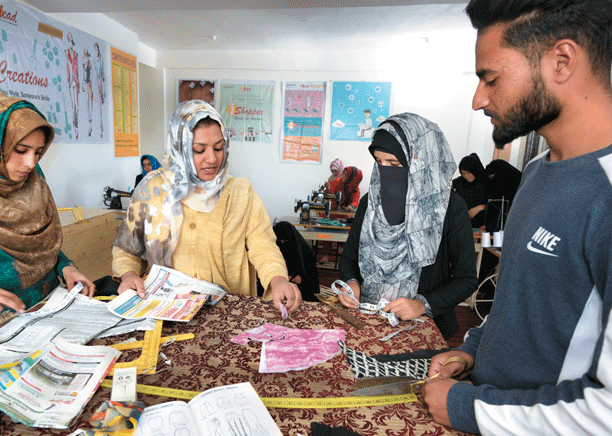
Tailoring courses equip the women to generate their own income where employment opportunities are scarce
In Srinagar, Microsoft India has collaborated with Aide et Action to provide skill development and capacity building courses to encourage self-employment amongst the youth. Through Ilead- the name of this training centre - both the partners provide courses in IT and fashion technology, free of cost, for a duration of three months. The curriculum design, technical assistance and software are provided by Microsoft. Prior to the training,the students undergo counselling sessions and a week-long induction to assess their interests and skill levels.
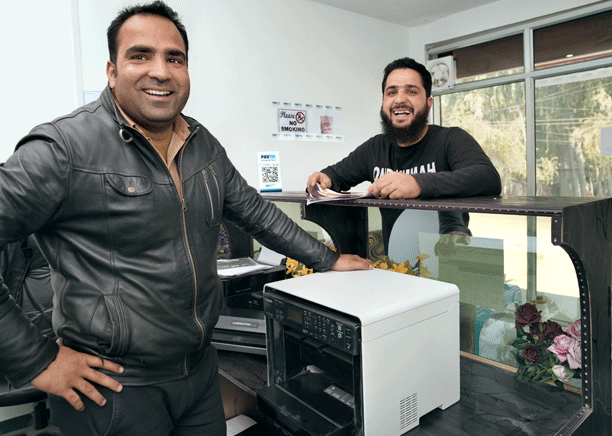
The training wing consists of three instructors two in IT and one in fashion and a mobiliser. The mobiliser interacts with the community, village Sarpanch and other influencers, identifies the students, and motivates them to join the courses. As part of the IT training, students are taught MS Office, tally and basic coding software such as C++ and HTML, all of them that can help one in running new age platforms such as blogs and websites. Suhail Quyoom and Wasim Ahmed are two such youth who benefitted from the Ilead training.
Both were unemployed, and their parents contacted Ilead to get them to enroll in the IT course. On completion of the course, the duo accumulated money from personal savings. With some more help from their parents and relatives, they launched a start-up called ‘ELL Mark Enterprises’, which provides services such as desktop publishing,photography, ticket booking, etc. in Srinagar. Today, the start-up has around 10 people working at different levels and they earn Rs. 15,000 per month from a business that’s less than a year old. In the future, they hope to expand the business. “We’ll do it,” says a determined Suhail.
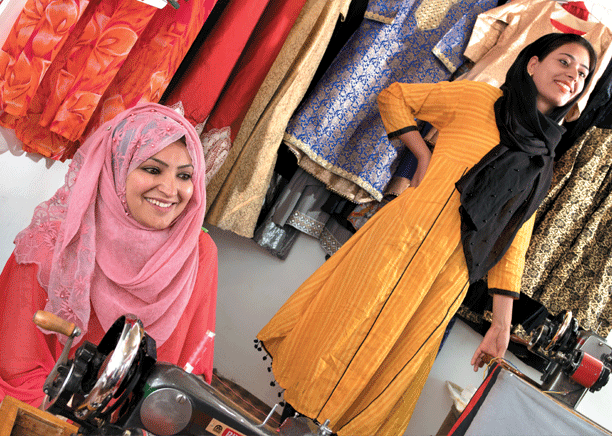
Nuzrat is breaking stereotypes in an area that traditionally relegates women to the fringes
The course in fashion technology training,
on the other hand, consists of tailoring and design classes wherein the
students’ progress is monitored through practical work. Each student keeps a
record which lists all their design work. This tracks the students’ progress
and makes them realize their potential and progress. This training and
counselling have helped women overcome their apprehensions to pursue bold
careers. Apart from professional skills, they usually result in personality
development. They nudge the students to become independent, both
economically and socially.
National Society for the Prevention of Blindness (NSPB) –India, is an
organization that works on various aspects of prevention of blindness and
healthcare.
The core belief of NSPB revolves around the fact that millions of ‘blind people’ in the country could retrieve their eyesight with minor interventions. The Golden Jubilee Foundation has been an associate in the efforts of NSPB. Through funding the second floor of the NSPB Karkardooma Eye Hospital building, the Foundation has assisted in providing high-class facilities at a subsidized rate. The Karkadooma Eye Hospital acts as a community ophthalmology centre, relying on experienced ophthalmologists and community workers, where the second floor functions as operating theater area for minor and major procedures along with in-patient facilities for the poor.
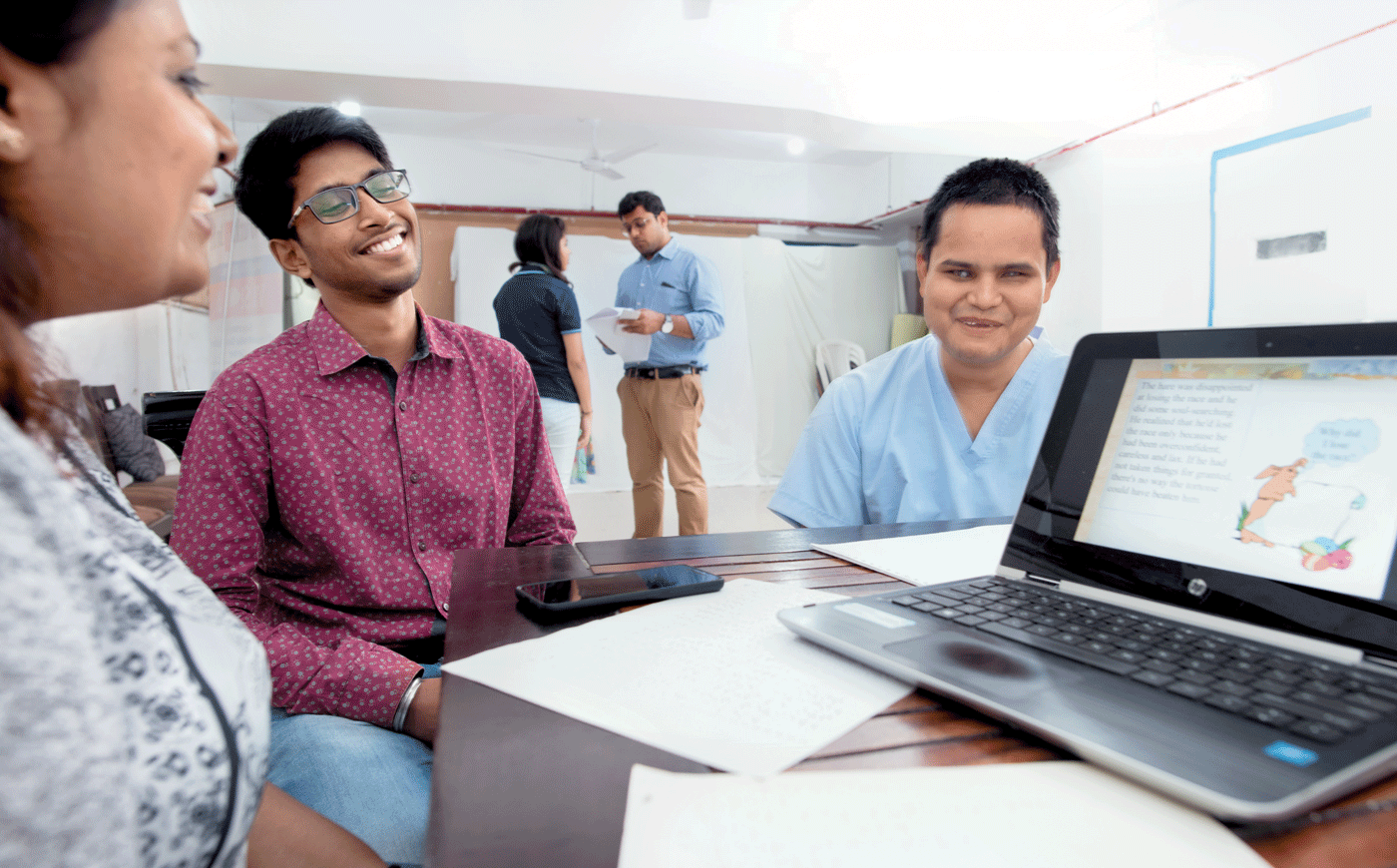
Students with visual disability are given assistance through education and counselling to tackle the world on their own
In New Delhi, Microsoft works with Youth4jobs, an organization which focuses on providing skill development and job opportunities to people with disabilities. The two partners train visually impaired students to make them industry-ready. The main belief of this training programme is that no one is born industry-ready, everyone has to be trained. The idea is to debunk the myth that people with disabilities usually underperform.
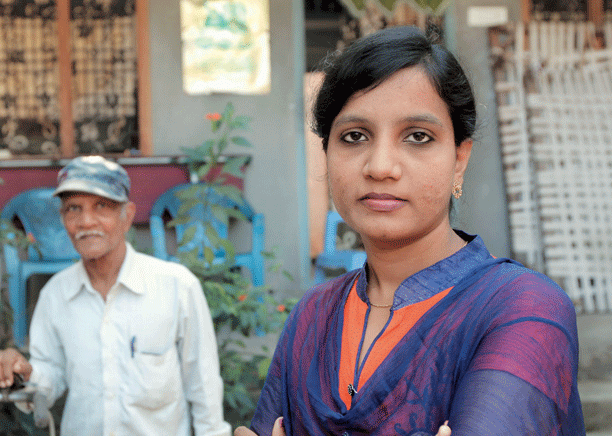
Sheikh Alisha Bhanu, Nasscom Microsoft Trainee from Gollavilli village in East Godavari Distt of Andhra Pradesh
Research indicates that even if there is any variation in the performance level between the two groups, the conventionally abled and people with disabilities, the latter may have an advantage. The school for the visually impaired in New Delhi has a third partner other than those mentioned above the Blind Relief Association (BRA), which has provided some space to set up the training centre and allowed access to its library. Microsoft does the curriculum design, provides original software, and acts as a partial funder. The training centre provides multiple skill development programmes, including advanced computer education that involves basic coding using HTML and PYTHON, over a period of six months.
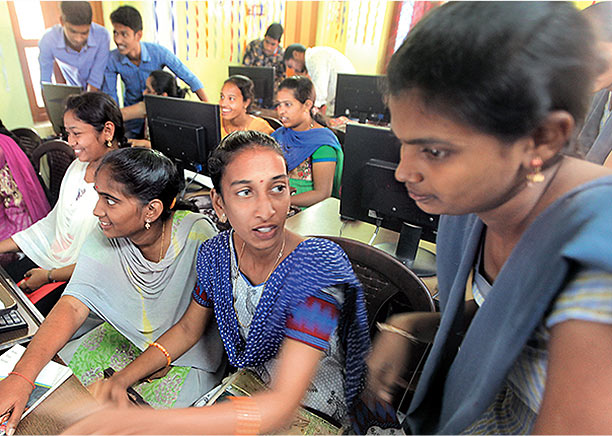
The courses in the field of IT have produced multiple success stories in the East Godavari district of Andhra Pradesh
To begin with, an evaluation test is conducted to analyse the potential students’ level of proficiency in computer education, and command over the language. In addition, mentoring programmes prepare the students to face everyday workspace issues. The students are encouraged to travel alone from their houses to the training school. In addition to all the activities, parents and students who are reluctant to pursue the courses are given counselling sessions to explain the necessity of being independent and confident.
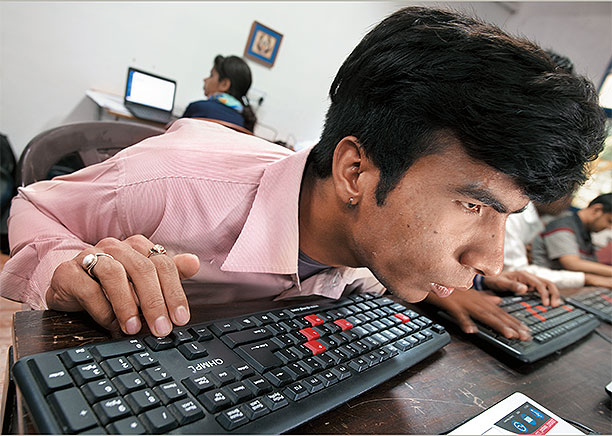
With dedicated software and thorough training, students with visual disability perform at par with the rest
Birkha Badhurkumi, a resident of Sikkim, never thought of using a computer until he heard about a person in Calcutta who was also visually impaired but could use a computer with the help of special software. An intrigued Birkha heard about the Blind School in Delhi and migrated from his home state. He now pursues a multi-skill certification course here. “There is no such school for the blind in Sikkim. Moreover, travelling all the way here will not be possible for my fellow brothers in my state. So, I hope to start my own training centre in Sikkim,” says Birkha.




